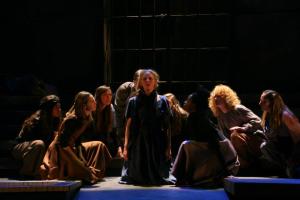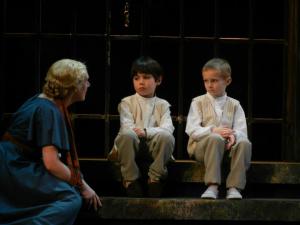Polygamous Infidelity and Vengeful Homicide showcased at Clemson University
Polygamous infidelity and vengeful homicide were what awaited Clemson University theatre goers the night of March 2nd, and that was just what they received. Upon entering the auditorium of the Brooks Center for the Performing Arts, one was greeted by a steely cold set dominated by a stone-like structure and beautiful, stair-stepping platforms creating aesthetic angles of perspective and uniquely varied acting spaces. A large, barred gate positioned in the center of the back wall provided pleasing symmetry, and together with the high walls around it they created an ancient and pitiless atmosphere. Shannon Robert, director and designer of this production, combined grand proportion and simplicity in such a way that seemed to say, “This is a hard and unforgiving place.” The character Medea would agree.

Design by Shannon Robert
Medea was written by the ancient Greek playwright Euripides and first produced in 431 B.C. at the Dionysian festival in Athens, Greece. It chronicles the mythical tale of the spurned wife Medea, and her bloody quest to avenge herself against her husband, Jason. These religious festivals, like the festival of Dionysius, held playwriting competitions each year, and when Medea made its dramatic premiere it was only awarded 3rd place. However, it is theorized that Euripides altered the legend by including that Medea herself killed her own children rather than the original notion that the Corinthians did so after Medea fled. This may explain why it was not as highly favored when playwrights Euphorion and Sophocles took 1st and 2nd places respectively over Euripides’ Medea. Regardless of its ancient Athenian reception nearly 2,500 years ago, Medea continues to be a timeless tragedy which powerfully strikes home.

Hunter Spangler as Jason
It is a rare privilege to see so old a text recreated in such a vibrant and accessible form. The selection of the translation by Kenneth McLeish and Frederic Raphael proved effective in order to justify the age of the text with the collegiate nature of the primary audience. At no point would the average theatre goer have ever felt lost or confused as to the plot or its tragic spiral down toward the inevitable. In addition to this, the actors all had a clear handle on the text and, as such, were able to communicate Medea’s themes with surprising clarity. The chorus deserves some special attention on this note. The rhythmic and stylized approach Shannon Robert brought to the chorus translated into a technically diverse and intricate process that would have proven challenging to unify for most directors. However, the result was a multi-person chorus that functioned very much as a unit. They crept and crawled and sighed and gasped together as they set the tone for the dramatic action. Individually and collectively they would declaim their opinion of the characters’ choices and positions throughout the play.

Lauren French as Medea
Technically speaking, the production was knit tight. Sound and light cues were nearly flawless as the play accelerated forward. The overall design was exciting, pleasing to the eye, and unified in its tone and nature. It served as the appropriate engine from which the characters could be launched. The characters were distinct and interesting in their portrayal, though there were incredible gaps between some of the performers in terms of acting experience. Historically, Greek theatre was not characterized by realism, and perhaps this served to aide in defining acting choices, but there were certain aspects of the acting that seemed slightly jarring. With Medea’s first lines, the audience was smacked with an off stage groan that seemed clavicular and forced rather than raw grief and jealousy spilling from a realistic character. Once again, perhaps this was intentional; as such a choice would have been more characteristic of an authentic Greek performance. This type of trademark perforated the production and was not only evident in the title character, but also the majority of the actors. With that minor criticism, one would be remiss not to point out how challenging these roles are, and with what incredible clarity they were executed.
Thematically, the production effectively preserved the Greek ideals of recognition and reversal. In a twisted sort of way, it was thrilling to be “purged” of emotion as one watched the character, Jason, recognize his error in the wake of so much death and loss. “Medea” as a title may be slightly deceptive as it implies that she is the play’s primary focus, and though she carries the brunt of the text and drives the plot with her thirst for vengeance, Jason is the character whose life is completely overhauled due to the violent suffering he endures before the end of this play. It is easy to see Medea as the antagonist in light of the evil atrocities she commits, but in the end, Jason believes strongly that it was entirely his fault for being unfaithful to begin with.
The Clemson Players, in association with Greenville’s Warehouse Theatre, did a fantastic job of recreating this archaic legend. This was an incredibly cultural experience that I am glad to have attended. Perhaps we will see more Greek Tragedy from Clemson in the future. It would be a joy. At any rate, thanks to Shannon Robert and the cast and crew who worked so hard to bring us the 2013 production of Medea.


